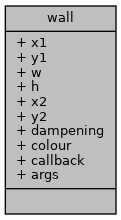Object to represent a wall that balls bounce off of. More...
#include <TUM_Ball.h>

Data Fields | |
| signed short | x1 |
| signed short | y1 |
| signed short | w |
| signed short | h |
| signed short | x2 |
| signed short | y2 |
| float | dampening |
| unsigned int | colour |
| callback_t | callback |
| void * | args |
Detailed Description
Object to represent a wall that balls bounce off of.
A wall object is created by passing the top left X and Y locations (in pixels) and the width and height of the desired wall. The wall also stores a colour that can be used to render it, allowing for the information to be stored in the object. A wall interacts with balls automatically as all walls generated are stored in a list that is iterated though by the function checkBallCollisions.
When a wall is collided with it causes a ball to loose or gain speed, the dampening is a normalized percentage value that is used to either increase or decrease the balls velocity. A dampening of -0.4 represents a 40% decrease in speed, similarly 0.4 represents a 40% increase in speed.
Please be aware that the position of a ball can be tested slower than a ball can move when the ball is moving extremely quickly, this can cause the balls to jump over objects, this is due to the extremely simple collision detection implemented.
A walls callback is a function pointer taking a function of the format void (*callback)(void *). If the function is set the that function is called when the wall is collided with. This allows for actions to be performed when a specific wall is collided with.
Field Documentation
◆ args
| void* wall::args |
Collision callback args
◆ callback
| callback_t wall::callback |
Collision callback
◆ colour
| unsigned int wall::colour |
Hex RGB colour of the ball
◆ dampening
| float wall::dampening |
Value by which a balls speed is changed, eg. 0.2 represents a 20% increase in speed
◆ h
| signed short wall::h |
Height of wall (Y axis)
◆ w
| signed short wall::w |
Width of wall (X axis)
◆ x1
| signed short wall::x1 |
Top left corner X coord of wall
◆ x2
| signed short wall::x2 |
Bottom right corner X coord of wall
◆ y1
| signed short wall::y1 |
Top left corner Y coord of wall
◆ y2
| signed short wall::y2 |
Bottom right corner Y coord of wall
The documentation for this struct was generated from the following file:
 1.8.17
1.8.17